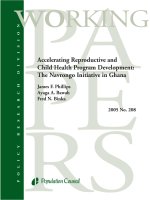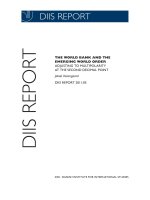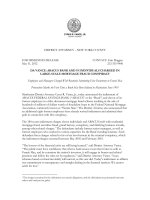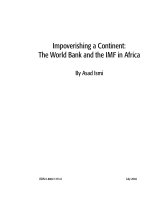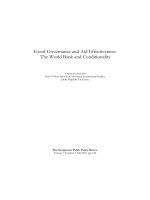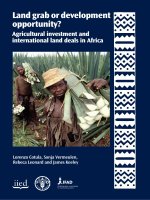carroll - delusions of development; the world bank and the post-washington consensus in southeast asia (2010)
Bạn đang xem bản rút gọn của tài liệu. Xem và tải ngay bản đầy đủ của tài liệu tại đây (3.6 MB, 286 trang )
Delusions of Development
9780230229556_01_prexvi.indd i9780230229556_01_prexvi.indd i 07/19/2010 13:50:4707/19/2010 13:50:47
Critical Studies of the Asia Pacifi c Series
Series Editor: Mark Beeson, Professor in the Department of Political Science and
International Studies at the University of Birmingham, UK
Critical Studies of the Asia Pacific showcases new research and scholarship on what
is arguably the most important region in the world in the twenty-first century.
The rise of China and the continuing strategic importance of this dynamic
economic area to the United States mean that the Asia Pacific will remain cru-
cially important to policymakers and scholars alike. The unifying theme of the
series is a desire to publish the best theoretically-informed, original research on
the region. Titles in the series cover the politics, economics and security of the
region, as well as focussing on its institutional processes, individual countries,
issues and leaders.
Titles include:
Toby Carroll
DELUSIONS OF DEVELOPMENT
The World Bank and the post-Washington Consensus in Southeast Asia
Shahar Hameiri
REGULATING STATEHOOD
State Building and the Transformation of the Global Order
Hiro Katsumata
ASEAN’S COOPERATIVE SECURITY ENTERPRISE
Norms and Interests in a Regional Forum
Erik Paul
OBSTACLES TO DEMOCRATIZATION IN SOUTHEAST ASIA
A Study of the Nation-State, Regional and Global Order
Barry Wain
MALAYSIAN MAVERICK
Mahathir Mohamad in Turbulent Times
Robert G. Wirsing and Ehsan Ahrari (editors)
FIXING FRACTURED NATIONS
The Challenge of Ethnic Separatism in the Asia-Pacific
Critical Studies of the Asia Pacifi c Series
Series Standing Order ISBN 978–0–230–22896–2 (Hardback)
978–0–230–22897–9 (Paperback)
(outside North America only)
You can receive future titles in this series as they are published by placing a stand-
ing order. Please contact your bookseller or, in case of diffi culty, write to us at the
address below with your name and address, the title of the series and the ISBN
quoted above.
Customer Services Department, Macmillan Distribution Ltd, Houndmills,
Basingstoke, Hampshire RG21 6XS, England
9780230229556_01_prexvi.indd ii9780230229556_01_prexvi.indd ii 07/19/2010 13:50:4907/19/2010 13:50:49
Delusions of Development
The World Bank and the post-Washington
Consensus in Southeast Asia
Toby Carroll
Research Fellow, Centre on Asia and Globalisation,
National University of Singapore
9780230229556_01_prexvi.indd iii9780230229556_01_prexvi.indd iii 07/19/2010 13:50:4907/19/2010 13:50:49
© Toby Carroll 2010
All rights reserved. No reproduction, copy or transmission of this
publication may be made without written permission.
No portion of this publication may be reproduced, copied or transmitted
save with written permission or in accordance with the provisions of the
Copyright, Designs and Patents Act 1988, or under the terms of any licence
permitting limited copying issued by the Copyright Licensing Agency,
Saffron House, 6–10 Kirby Street, London EC1N 8TS.
Any person who does any unauthorised act in relation to this publication
may be liable to criminal prosecution and civil claims for damages.
The author has asserted his right to be identified as the author of this work
in accordance with the Copyright, Designs and Patents Act 1988.
First published 2010 by
PALGRAVE MACMILLAN
Palgrave Macmillan in the UK is an imprint of Macmillan Publishers Limited,
registered in England, company number 785998, of Houndmills, Basingstoke,
Hampshire RG21 6XS.
Palgrave Macmillan in the US is a division of St Martin’s Press LLC,
175 Fifth Avenue, New York, NY 10010.
Palgrave Macmillan is the global academic imprint of the above companies
and has companies and representatives throughout the world.
Palgrave® and Macmillan® are registered trademarks in the United States,
the United Kingdom, Europe and other countries.
ISBN 978–0–230–22955–6 hardback
This book is printed on paper suitable for recycling and made from fully
managed and sustained forest sources. Logging, pulping and manufacturing
processes are expected to conform to the environmental regulations of the
country of origin.
A catalogue record for this book is available from the British Library.
Library of Congress Cataloging-in-Publication Data
Carroll, Toby, 1975–
Delusions of development: the World Bank and the post-Washington
consensus in Southeast Asia / Toby Carroll.
p. cm. — (Critical studies of the Asia-Pacific series)
ISBN 978–0–230–22955–6 (hardback)
1. World Bank—Southeast Asia. 2. Southeast Asia—Economic
conditions. 3. Southeast Asia—Politics and government. I. Title.
HG3881.5.W57C36 2010
332.1'5320959—dc22
2010023774
10 9 8 7 6 5 4 3 2 1
19 18 17 16 15 14 13 12 11 10
Printed and bound in Great Britain by
CPI Antony Rowe, Chippenham and Eastbourne
9780230229556_01_prexvi.indd iv9780230229556_01_prexvi.indd iv 07/19/2010 13:50:4907/19/2010 13:50:49
v
Preface: Delusions of Development: the World Bank and
the post-Washington Consensus in Southeast Asia vii
Acknowledgements ix
List of Abbreviations xiii
Introduction: Delusions of Development – the World Bank,
the post-Washington Consensus and Politics
in Southeast Asia 1
1 Contending Understandings of the New Development
Agenda 18
2 SIN Rising 38
3 Getting the ‘New Basics’ Right: the Prescriptive Themes
of SIN and their Intellectual Foundations 68
4 Embedding the New Basics: the Delivery Devices and
Political Technologies of SIN 96
5 Attempting Market Extension through SIN: the
Privatisation of Manila’s Water 115
6 Participating in the Embedding of SIN: the World Bank’s
Country Assistance Strategy for the Philippines 133
7 Everyone Loves a Winner: the Politics of Partnership
in Vietnam and Cambodia 155
8 A ‘SINful’ Approach to Poverty Reduction?
Community-Driven Development and Attempting
Market Citizenship in Indonesia 180
Conclusion: The Impossible Mission and its Antidote 208
Notes 216
Bibliography 240
Index 261
Contents
9780230229556_01_prexvi.indd v9780230229556_01_prexvi.indd v 07/19/2010 13:50:4907/19/2010 13:50:49
This page intentionally left blank
vii
Preface: Delusions of Development:
the World Bank and the
post-Washington Consensus
in Southeast Asia
This book deals with a critical issue of our time – the World Bank’s pro-
motion of market-led development in the underdeveloped world and
the impact that this promotion has upon citizenship. It looks at this
subject through case studies drawn from one of the world’s most diverse
regions: Southeast Asia. In a world where roughly half the population
lives on less than US$2 a day and where billions still lack access to the
benefits of well-established advances in areas such as health, water
and education, development as a process of material improvement has
taken on a new urgency. Within this environment, the World Bank, as
the lead global institution charged with tackling poverty, dominates
the development agenda. In turn, many writers have looked at the
reforms that the Bank promotes, especially at the organisational level
(as opposed to the field level). However, what is lacking in the existing
literature on the Bank is an integrated analysis of the Bank’s approach
that includes an understanding of how the Bank delivers its mix of pro-
market reform together with an analysis of the reforms themselves.
This means that most commentators on the Bank have critically missed
the impact that the organisation’s current methods and reforms actu-
ally have upon the relationship between state and citizen. It has also
resulted in insufficient attention being given to the politics that the
Bank’s work encounters on the ground. Crucially, without addressing
these elements it is impossible to assess what an organisation like the
Bank actually does. This book fills the existing gap by focusing upon
the various methods employed by the World Bank in the field to embed
liberal market development.
The book asserts that the Bank, frustrated by the earlier politics of
development, has used various political technologies (such as partici-
patory approaches) and delivery devices (new programme and project
instruments) in its attempt to establish market societies. These political
technologies and delivery devices often appear to be about increasing
participation and inclusion in policy-making processes. However, in
9780230229556_01_prexvi.indd vii9780230229556_01_prexvi.indd vii 07/19/2010 13:50:4907/19/2010 13:50:49
viii Preface
practice (using a combination of co-option, functionalist consensus
building, opposition marginalisation and via maintaining a monopoly
on what constitutes development ‘knowledge’) these elements actually
do the reverse – they attempt to narrow and constrain politics in the
interests of establishing market society (which itself is seen as requiring
the insulation of particular institutions from politics in the interest of
the market). In short, the Bank promotes illiberal politics in its promotion of
liberal economics. While such technologies and delivery devices attempt
to circumvent the political obstacles to reform, institutions (especially
those of the state), as the targets of reform, remain politically consti-
tuted. In particular, they represent the outcomes of political battles
between interests, and in particular class interests. Subsequently, despite
the Bank’s new methods for embedding market society, reform remains
no technical exercise, often resulting in outcomes that are a long way
from any neoliberal ideal and which regularly fail to achieve discernible
positive development outcomes.
TOBY CARROLL
Singapore
9780230229556_01_prexvi.indd viii9780230229556_01_prexvi.indd viii 07/19/2010 13:50:4907/19/2010 13:50:49
ix
Acknowledgements
This book was written in two main phases between 2004 and 2009. The
bulk of the manuscript was drafted between 2004 and 2007 at the Asia
Research Centre, Murdoch University. Additional writing and finalis-
ing of the text was done at the Centre on Asia and Globalisation at the
National University of Singapore, in 2009. Many people in both places
and beyond deserve acknowledgement for their time, patience and
understanding in helping me produce the final work. My sincere apolo-
gies if I have missed anyone out.
The primary research for the manuscript was conducted over four sepa-
rate fieldtrips: two trips that each took in Indonesia, Thailand and the
Philippines during 2005; one to Washington, DC in 2008; one to Vietnam
and Cambodia in 2009. Scores of interviewees whom I met with on these
trips contributed important perspectives and offered suggestions that
had a significant impact on the shape of my research. People from non-
governmental organisations, activist groups, academia, communities,
local and national government, the private sector, media, and of course
the World Bank, gave up their time to answer questions and proffer infor-
mation. While for various reasons they are not mentioned individually
by name here, it is fair to say that without their collective response this
work simply would not have been possible. In addition to those critical
in the collection of ‘primary data’, I am also particularly appreciative of
the numerous people who have provided me with important opportuni-
ties to present my work to academic and non-academic audiences over
the last few years – experiences which have assisted me in sharpening
my analysis. In this regard, I am very appreciative of Richard Robison’s
invitation to present evolving versions of chapter 6 at two conferences at
the Institute for Social Studies in The Hague during 2006. Additionally,
I am grateful to Diane Stone for organising a workshop on the World
Bank in Singapore in 2006 (during the annual International Monetary
Fund/World Bank meetings) where I was able to present an early version
of chapter 8. Importantly also, Wil Hout, John Harriss and Paul Cammack
deserve acknowledgement for their comments on the original text that
formed the base structure for the book. Their recommendations assisted
me greatly in preparing the final manuscript for Palgrave Macmillan.
My two ‘homes’ for writing up the project were also critical in the
formation of ideas, not to mention the provision of palliative care when
9780230229556_01_prexvi.indd ix9780230229556_01_prexvi.indd ix 07/19/2010 13:50:4907/19/2010 13:50:49
x Acknowledgements
it was required. The Asia Research Centre (ARC) has garnered an impres-
sive reputation for its scholarly output; a reputation which transcends
its size and geographical location in one of the world’s most isolated
major cities: Perth. For nearly twenty years, the Centre has been home
to a range of innovative and research-active scholars, producing doc-
toral graduates who fill academic positions all over the world. Under
the directorship of Garry Rodan, the ARC’s achievements were impres-
sive, especially given the situation in Australian higher education under
John Howard’s government. It was a place where hierarchy was not
paramount, where postgraduates (who make up the bulk of the Centre’s
population) were encouraged by their mentors to significantly input
into research agendas separate to their own, and where collegiality and
genuine friendship existed at a level that encouraged envy. My four
years at the Centre were characterised by the forging of lasting friend-
ships and often intense conversations on all manner of topics, from the
nature and evolution of neoliberalism to the respective career trajecto-
ries of our favourite musicians. It is not being dramatic to say that were
it not for the ARC, and all that goes with it, this book would not have
been possible. Specifically, I wish to thank my Centre friends, Carolin
Liss, Sidney Adams, Miyume Tanji, Ian Wilson, Shahar Hameiri, David
Flynn, Stuart Latter, Martin Gwyn-Fawke and Tamara Dent. Tamara,
as the Centre’s extremely capable ‘fixer’, deserves extra special thanks
for her assistance in rectifying unexpected fieldwork dramas (such as
impromptu flight reservation cancellations in the Philippines) and all
manner of other complications.
My current residence, the Centre on Asia and Globalisation (CAG),
exhibits much in common with the ARC – a reality for which I am
extremely fortunate. Ann Florini, the CAG’s director, has rapidly estab-
lished an ambitious research agenda for the Centre that seeks to tackle
global problems, while allowing research fellows significant latitude and
intellectual autonomy in determining how such problems are engaged
with – increasingly rare qualities in academia. Unlike many who display
tentative and conditional support for intellectual pluralism, especially
when driven by funding concerns, Ann is a committed pluralist, to
which her support for all of us (including the odd Marxist) stands as
testament. For their friendship and intellectual contributions, I also
wish to thank my good friends at CAG who have been fantastic sources
of support and inspiration during my time in Singapore. In particular,
Tess del Rosario, Esther Yeoh, Tan Yeling, Ong Yanchun, Melissa Ong,
Jasmin Kaur and Sandra Ng have been outstanding in their unswerving
patience, company and loyalty. Ong Yanchun deserves special thanks
9780230229556_01_prexvi.indd x9780230229556_01_prexvi.indd x 07/19/2010 13:50:4907/19/2010 13:50:49
Acknowledgements xi
for proof-reading a draft of the manuscript prior to its delivery to
Palgrave Macmillan.
Rather importantly, I must also convey my appreciation to the series
editor, Mark Beeson, for his offer to be part of a series on Asia that holds
out such exciting prospects. Indeed, this is probably one of the most
interesting series on the region to emerge since the Asia Research Centre
put itself on the map with series like the ‘The New Rich in Asia’ and
‘Asian Capitalisms’. As series editor, Mark deserves credit for conceiv-
ing of a series based around an exciting theme at a critical moment in
history. Palgrave Macmillan deserve acknowledgement for supporting
the series and, in particular, I am indebted to Alexandra Webster and
Liz Blackmore for their handling of my contribution to the series from
proposal to publication.
I should perhaps also confess here that two of the case study chapters
(6 and 8) clearly evolved from earlier publications. An earlier version
of chapter 6 was published in the excellent 2009 Routledge volume,
Governance and the Depoliticisation of Development, edited by Will Hout
and Richard Robison. A quite different version of chapter 8 appeared in
Development and Change (volume 40, number 3), under the title ‘Social
Development as Neoliberal Trojan Horse.’ Both modified versions have
been incorporated here with the kind permission of Routledge and
Wiley-Blackwell respectively, for which I am grateful.
Three people, Kanishka Jayasuriya, Max Lane and Garry Rodan,
deserve special mention for their assistance and commitment to the
project that this book has been. Kanishka, who was a co-supervisor for
my doctoral dissertation, provided much in the way of comments on
the original text, ideas for consideration and secondary material for
scrutiny. Kanishka is a true scholar in an age of often-thin intellectual-
ism, and, as the reader will discover, his intellectual contributions on the
regulatory state and market citizenship have left an indelible impression
upon this book. For all his efforts I am extremely thankful. Max, who
spent significant portions of time with me both at the ARC and in the
Lion City, has been a very close confidant on all matters. In particular,
I have valued our friendship and the many enjoyable discussions that
we have had; discussions which I consider an important catalyst in the
development of my thinking, and which have had a substantive impact
upon my written work. Max’s determination not only to understand the
world around us but also to change it has been an edifying source of
inspiration in a world replete with unconvincing and sometimes spuri-
ous ‘change agents’ and ‘norm entrepreneurs’. Garry has been with this
project longer than any other. He co-supervised my Honours dissertation
9780230229556_01_prexvi.indd xi9780230229556_01_prexvi.indd xi 07/19/2010 13:50:4907/19/2010 13:50:49
xii Acknowledgements
(my first foray into research on the World Bank) and was my main PhD
supervisor. Garry is a supervisor and mentor like no other. His support
is absolute and enduring and I owe him a great debt. His suggestions are
always lucid and erudite, and free of any of the ambiguity that can make
academic work unnecessarily frustrating. His indefatigability has been
particularly stirring, encouraging me to pick myself up and persevere
when other less productive options presented themselves as seemingly
more attractive.
Finally, I would like to thank my parents, Barry and Loretta Carroll,
for being a constant source of support, friendship and love.
Toby Carroll, Singapore
9780230229556_01_prexvi.indd xii9780230229556_01_prexvi.indd xii 07/19/2010 13:50:4907/19/2010 13:50:49
xiii
List of Abbreviations
AAA Analytical and Advisory Activities/Assistance
ADB Asian Development Bank
AJI Alliance of Independent Journalists Indonesia
(Aliansi Jurnalis Independen)
BAPPENAS Indonesian National Development Agency
(Badan Perencanaan dan Pembangunan Nasional)
BOT Build–Operate–Transfer
CAS Country Assistance Strategy
CDF Comprehensive Development Framework
CG Consultative Group
CoP Committee on Privatization
CPIA Country Policy and Institutional Assessment
CPRGS Comprehensive Poverty Reduction and Growth Strategy
CPP Cambodian People’s Party
CPS Country Partnership Strategy
CPV Communist Party of Vietnam
CSO Civil Society Organisation
DANIDA Danish International Development Assistance
DfID Department for International Development
DK Democratic Kampuchea
DOF Department of Finance
ESAF Enhanced Structural Adjustment Facility
FDI Foreign Direct Investment
GNI Gross National Income
GOCC Government-owned or -controlled Corporation
GOI Government of Indonesia
HIPC Highly Indebted Poor Countries
HPAE High-Performing Asian Economies
9780230229556_01_prexvi.indd xiii9780230229556_01_prexvi.indd xiii 07/19/2010 13:50:5007/19/2010 13:50:50
xiv List of Abbreviations
IBRD International Bank for Reconstruction and Development
ICIJ International Consortium of Investigative Journalists
IDA International Development Association
IEG Independent Evaluation Group
IFC International Finance Corporation
IFI International Financial Institution
IMF International Monetary Fund
INT Department of Institutional Integrity
IPO Initial Public Offering
I-PRSP Interim Poverty Reduction Strategy Paper
JBIC Japan Bank for International Cooperation
JSA Joint Staff Assessment
JSAN Joint Staff Advisory Note
KDC Knowledge Development Center
KDP Kecamatan Development Program
KMU Kilusang Mayo Uno (May First Movement)
LCF League of Corporate Foundations
LGU Local Government Unit
LLI Local-Level Institution
MD Millennium Development Goal
MITI Ministry of International Trade and Industry
MOF Ministry of Finance
MTPDP Medium-Term Philippine Development Program
MWCI Manila Water Company Incorporated
MWSS Metropolitan Water and Sewerage Service
MWSS-RO Metropolitan Water and Sewerage Service Regulatory
Office
NEDA National Economic Development Authority
NGO Non-governmental Organisation
NIE New Institutional Economics
NSDP National Strategic Development Plan
ODA Official Development Assistance
9780230229556_01_prexvi.indd xiv9780230229556_01_prexvi.indd xiv 07/19/2010 13:50:5007/19/2010 13:50:50
List of Abbreviations xv
OECD Organisation for Economic Co-operation and
Development
OECD-DAC Organisation for Economic Co-operation and
Development-Development Assistance Committee
PHP Philippine Pesos
PID Project Information Document
PNPM National Program for Community Engagement
PPP Public–Private Partnership
PRA Participatory Rural Appraisal
PRGF Poverty Reduction Growth Facility
PRGO Poverty Reduction and Growth Operation
PRK People’s Republic of Kampuchea
PRPK People’s Revolutionary Party of Kampuchea
PRRM Philippine Rural Reconstruction Movement
PRSC Poverty Reduction Support Credit
PRSP Poverty Reduction Strategy Paper
PWC post-Washington Consensus
RRA Rapid Rural Appraisal
SAP Structural Adjustment Program
SDN Social Development Network
SDU Social Development Unit
SEDP Social Economic Development Plan
SGR Second Generation Reforms
SIN Socio-institutional Neoliberalism
SOE State-owned Enterprise
SwAP Sector-wide Approach
TA Technical Assistance
TUCP Trade Union Congress of the Philippines
TWG Technical Working Group
UATP Umiray-Angat Transbasin Project
VF Village Facilitator
WDR World Development Report
WIDER World Institute for Development Economics Research
9780230229556_01_prexvi.indd xv9780230229556_01_prexvi.indd xv 07/19/2010 13:50:5007/19/2010 13:50:50
This page intentionally left blank
1
Introduction: Delusions of
Development – the World Bank,
the post-Washington Consensus
and Politics in Southeast Asia
Encountering orthodox development practice and discourse today, two
defining linguistic trends are immediately apparent. The first is the
plethora of acronyms (PRSP, PRA, HIPC, CAS, SwAP, etc.) that litter the
reports and websites of ‘development’ organisations such as the World
Bank (not to mention the conversations of ‘development’ organisation
staff). The second is a now well-established language rich with progres-
sive-sounding words such as ‘participation’, ‘partnership’, ‘ownership’,
‘harmonisation’ and ‘empowerment’. Such entries in the new develop-
ment lexicon are regularly complemented by references to ‘institution
building’, ‘civil society’ and ‘social and human capital’. This is the
language of a new way of ‘doing development’ – a hegemonic approach
driven in no small way by the World Bank, and one rather ambitiously
tasked with freeing the world of poverty.
This book presents an exploration of this new approach, or what one
might call the real-existing post-Washington consensus (PWC), through
case studies drawn from Southeast Asia. For those of us engaged with or
in the work of the Bank, the notion of a real-existing PWC might seem
almost self-evident, although this understanding will no doubt be con-
ditioned by one’s situation. A ‘development’ practitioner might say that
it’s a new approach that places much greater emphasis upon the multi-
faceted nature of development. Conversely, a critical academic might
argue that it’s largely old wine in new bottles, and an activist could well
dismiss it as a smokescreen for the ongoing exploitation of the underde-
veloped world. So, what is it?
This book makes the case that the PWC in practice constitutes a new
form of neoliberal development governance that takes a qualitatively dif-
ferent approach to embedding and maintaining market society. In essence,
the core purpose of the new development governance is to continue the
9780230229556_02_intro.indd 19780230229556_02_intro.indd 1 07/19/2010 13:52:1907/19/2010 13:52:19
2 Delusions of Development
broad northern/western class project of extending the competitive market
into social life in ways that circumvent the implementation impediments
and crises of legitimacy that earlier phases of market-led development
encountered (Cammack 2009: 2–3). This form of governance, described
in the book as socio-institutional neoliberalism or SIN, has been increas-
ingly refined and rolled out by the World Bank (with elements being vari-
ously embraced by bilateral development agencies, non-governmental
organisations and governments alike) and complimented by the efforts
of organisations such as the International Monetary Fund, and the
Organisation for Economic Cooperation and Development.
Where the earlier Washington consensus sought to unleash market
forces and unveil new accumulation opportunities for capital through
simple policy prescriptions (such as privatisation, liberalisation and
fiscal austerity), the Bank’s SIN embodies a recognition that basic eco-
nomic reform alone is insufficient and that establishing liberal markets
is fundamentally a political project. Consequently, SIN comprises both a
market reform agenda for state and society and newly minted meth-
ods and mechanisms with which to embed and sustain that agenda.
Importantly, this attempt to reorganise the state and other socially
embedded institutions and spaces (including the family and civil soci-
ety) around the market is an exercise that implies a critical shift in the
relationship between state and citizen.
Within SIN, the state is conceived as a bundle of institutions for the
functional service of the competitive market (the most central of neolib-
eral institutions), and it is the ‘well-managed’ competitive market that
is tasked with realising the Bank’s self-proclaimed ‘dream’, inscribed on
a wall in its Washington headquarters, of a world free of poverty. SIN
stipulates very specific functions for the state to perform which relate
to protecting against market failure and its repercussions. However, SIN
grants no latitude to the state to substantively indulge in redistribution
or service delivery (without competition) to offset social inequalities.
Nor does it permit citizens the opportunity to demand non-market solu-
tions to issues of distribution. Instead, SIN, treats national economies
as ahistorical entities requiring technocratic assistance to ‘best manage’
apparently reconcilable interests – such as capital and labour – and cre-
ate an ideal market complete with market citizens.
Notably though, the constitution of this utopian market environment
does not just happen by itself and SIN’s composite form owes much to
this recognition. Subsequently, SIN incorporates an impressive array of
political technologies and delivery devices for achieving the constitu-
tion of market society. The latter (delivery devices) are given concrete
9780230229556_02_intro.indd 29780230229556_02_intro.indd 2 07/19/2010 13:52:1907/19/2010 13:52:19
Introduction 3
form in new World Bank projects and programmes that operate at vari-
ous political levels (national and local). The former (political technolo-
gies) are best represented by the novel methods of participation and
partnership operationalised to mobilise constituencies of support for
the implementation of the Bank’s projects and programmes and the
market norms and formal institutions promoted by them. All in all, SIN,
constitutes a political attempt by the Bank to relegitimise market-led
development, embed market society and institute market citizenship in
the name of poverty reduction.
The book’s argument and structure
In the pages below I offer a reconceptualisation of the post-Washington
consensus, in part by analysing its deployment by the World Bank in
one of the world’s most diverse regions: Southeast Asia. In a world
where roughly half the population lives on less than two dollars a day
and where billions still lack access to the benefits of well-established
advances in areas such as health, water and education, development as
a process of material improvement has taken on a new urgency. Indeed,
even before the full repercussions of the current global economic crisis
had hit the underdeveloped world, the world’s poor were facing the
brunt of new mega-crises – crises of a globalised nature that include the
fall-out associated with climate change and skyrocketing food prices,
with the latter leading to World Bank President Robert Zoellick calling
for a ‘New Deal’ on food (Carroll 2008: 7A). Within this environment,
the World Bank as the lead global institution charged with tackling
poverty dominates the development agenda. In turn, many writers
have looked at the reforms that the Bank promotes, especially at the
organisational level (as opposed to the field level). However, what has
been lacking in the existing literature on the Bank is an integrated
analysis of the Bank’s approach that includes an understanding of how
the Bank delivers its mix of pro-market reform together with an analysis
of the reforms themselves. This has meant that most commentators
on the Bank have critically missed the implications of the organisa-
tion’s current methods and reforms for the relationship between state
and citizen. It has also resulted in insufficient attention being given to
the politics that the Bank’s work encounters on the ground. Crucially,
without addressing these elements it is impossible to assess what an
organisation like the Bank actually does. This book fills the existing gap
by focusing upon the various methods employed by the World Bank in
the field to embed liberal market development.
9780230229556_02_intro.indd 39780230229556_02_intro.indd 3 07/19/2010 13:52:2007/19/2010 13:52:20
4 Delusions of Development
The book asserts that the Bank, frustrated by the earlier politics of
development, has used various political technologies (such as partici-
patory approaches) and delivery devices (new programme and project
instruments) in its attempt to establish market societies. These political
technologies and delivery devices often appear to be about increasing
participation and inclusion in policy making processes. However, in prac-
tice (using a combination of co-option, consensus building, opposition
marginalisation and via maintaining a monopoly on what constitutes
development ‘knowledge’) these elements actually do the reverse – they
attempt to narrow and constrain politics in the interests of establishing
market society (which itself is seen as requiring the insulation of particular
institutions from politics in the interests of the market). In short, the Bank
promotes illiberal politics in its promotion of liberal economics. While such
technologies and delivery devices attempt to circumvent the political
obstacles to reform, institutions (especially those of the state), as the tar-
gets of reform, remain politically constituted, representing the outcomes
of political battles between interests, and in particular class interests.
Subsequently, despite the Bank’s new methods for embedding market
society, reform remains no technical exercise, often resulting in outcomes
that are a long way from any neoliberal ideal. More importantly, the
Bank’s efforts regularly fail to achieve discernible positive development
outcomes and, indeed, often assist in achieving the reverse! While SIN
is at its core an attempt to relegitimise the World Bank’s work and establish
market society (the Bank’s core perfunctory prerequisite for poverty reduc-
tion), the book also makes the point that the Bank’s project is a deeply
contradictory undertaking that seeks to build fanciful institutions (‘ide-
ally regulated liberal markets’) on a global scale, utilising mono-political
‘participatory’ methods designed to render reconcilable antagonistic social
interests (such as labour and capital). It is also a project that, for reasons of
legitimacy, is found to be rather hamstrung in many of the environments
that many would think should be the Bank’s ‘bread and butter’.
The first four chapters of the book make a case for reconceptualising
the post-Washington consensus and present a new analytical frame-
work, based around SIN, for this purpose. They do this by detailing the
different conceptualisations of the new development agenda and their
limitations, the political and historical development of SIN, and SIN’s
formal constitutive elements. The four subsequent case study chapters
demonstrate how SIN unfolds in the field, allowing us to see what SIN’s
different elements (its concentration upon institutions, participation,
partnership etc.) mean in practice, beyond their articulation within the
Bank’s World Development Reports and the pronouncements of its senior
9780230229556_02_intro.indd 49780230229556_02_intro.indd 4 07/19/2010 13:52:2007/19/2010 13:52:20
Introduction 5
office holders. Importantly, the case studies also allow us to observe the
politics that the Bank’s approach generates and encounters.
Chapter 1 looks at the various competing conceptions of the new
development agenda. The chapter argues that although some erudite
work has been done defining and critiquing the post-Washington con-
sensus, much of this has emphasised the PWC’s prescriptive content
rather than understanding the PWC as a political project. Subsequently,
the chapter proposes a new way of understanding the new develop-
ment agenda as a form of governance (SIN) that is both a combination
of institutional/policy prescriptions and the means by which to deliver
and embed those, an effort that at its roots seeks to reconstitute the
relationship between state and citizen. The chapter also emphasises
the importance of understanding how SIN unfolds in the field. This is
important because it is in the field where we see the weighting accorded
to many of SIN’s elements and, crucially, the actual form taken by such
elements. It is one thing to read about the World Bank’s approach to
participation and partnership in a World Development Report – quite
another to see what these terms mean when they are impacted by
pragmatic considerations of staff and the broader politics attending
‘development’ on the ground.
Chapter 2 details the ascendancy of SIN, placing it in historical and
political perspective. This assists in explaining not only why SIN emerged
in the first place but why it took on the very form that it has. In particu-
lar, the chapter makes clear the manner in which the Bank and market-
led development more broadly were prone to problems in practice and
explanatory difficulties that constituted a crisis of legitimacy. Conflict
stemming from the operationalisation of the Washington consensus
(in the former Soviet Bloc, Latin America and Africa, for example), not
to mention fallout from large-scale multilateral-funded infrastructure
projects (perhaps most notably dams) meant that by 1994, when the
Bank was preparing for its 50-year celebrations it was, to quote senior
Bank staffer Ruth Kagia, ‘an institution under siege’ (Kagia 2005: 2). The
Bank and neoliberalism more generally had a complicated time explain-
ing the Asian ‘miracle’ too, a conundrum that would only be amplified
by a rather selective reading of East Asian development and its subse-
quent dramatic collapse in 1997 with the onset of the Asian crisis. As a
result of this, the chapter argues that neoliberalism and the World Bank
were forced, both by pressure from within and without, to change.
And change they did. New emphases were placed upon the impor-
tance of institutions and qualities such as ‘ownership’ and ‘participa-
tion’ for market constitution and function. As chapter 3 (‘Getting the
9780230229556_02_intro.indd 59780230229556_02_intro.indd 5 07/19/2010 13:52:2007/19/2010 13:52:20
6 Delusions of Development
New Basics Right’) demonstrates, much of the prescriptive evolution
within SIN would draw heavily from relatively recent developments
within orthodox economics, in particular the insights of new insti-
tutional economics (NIE). NIE’s emphasis upon ‘information asym-
metries’ and ‘transaction costs’ and the importance of institutions for
attending to both, forms the theoretical rigour underpinning much
within SIN. Indeed, NIE’s influence is strewn all throughout SIN’s social-
engineering efforts, most evident in the way in which SIN attempts
to deal with imperfect markets by specifying ‘institutional’ panaceas.
New World Bank projects and programmes are now tasked with ‘build-
ing’ and ‘reshaping’ institutions, including legal systems, systems of
property rights, state and non-state mechanisms of accountability and
transparency and even social institutions, on the justification of reduc-
ing the cost of market activity, re-balancing information asymmetries
and addressing ‘market imperfections’ associated with these. Not sur-
prisingly, this approach grants a key role to the state, which in large
measure is supposed to be a ‘regulatory state’ (Jayasuriya 2000) which
is to establish ‘ideal’ institutional regimes attractive to capital while
also guarding against market behaviour that could compromise mar-
ket efficiency and legitimacy. The SIN state is even supposed to make
up for the apparent tendency of individuals to under-invest in certain
areas. For example, the SIN state is accorded responsibility for ensuring
(though certainly not necessarily providing) the conditions required for
the successful reproduction and improvement of the proletariat, taking
on semi-custodial roles to ensure the production of ‘human capital’
and investment in ‘family formation’ to assist workers to make more
productive use of their most abundant asset – their labour (Cammack
2009: 2; World Bank 1990: 3). It is also supposed to ensure certain very
limited safety nets are in place, to help shield the market against popu-
lar demands for market-unfriendly action. Such foci complement the
old and sometimes revised elements of the Washington consensus: the
early neoliberal fetish for privatisation has now morphed into a reify-
ing of public–private partnerships and the importance of having the
right regulatory structures in place; liberalisation still matters but must
be complimented with the right institutional framework; the central
anchor of neoliberal macroeconomics remains significantly intact.
However, critically evaluating SIN is not just about identifying its the-
oretical underpinnings and the obvious prescriptive elements through
which NIE finds expression. Chapter 4 (‘Embedding the New Basics’)
looks at how the concern with implementation has been addressed with
novel and innovative delivery devices and political technologies. In this
9780230229556_02_intro.indd 69780230229556_02_intro.indd 6 07/19/2010 13:52:2007/19/2010 13:52:20
Introduction 7
book, the term ‘delivery devices’ refers to mechanisms such as Poverty
Reduction Strategy Papers (PRSPs) or Country Assistance Strategies
(CASs), as well as individual projects and programmes. These devices
constitute important containers of reform, values and norms that oper-
ate variously at the local and national level. ‘Political technologies’ are
those methods used by the Bank to attempt to assist with the further
extension of the formal institutions of the liberal market and its attend-
ant norms and values into social life and are in no small way intimately
fused with SIN’s delivery devices. Such technologies are particularly
evident in arrangements of ‘partnership’ and processes of ‘participa-
tion’, which attempt to harness support for the Bank’s agenda beneath
a veneer of inclusiveness and pluralism. These technologies attempt to
knit together coalitions of interests amenable to the project at hand –
which perhaps could be understood in neoliberal ‘development’ par-
lance as a form of social capital. Importantly, however, the very design
of these technologies circumscribes the input of those inimical to SIN.
Where the Bank pushes such processes it does not have to physically
exclude opposition from participating in consultation processes and the
like. Indeed, as chapter 6 describes, opposition groups often choose to
exclude themselves for a whole host of reasons – many of which speak
volumes about the political design of the Bank’s methods.
What is essential here is that terms like participation and partner-
ship are more than just spurious lingo or clever spin. They are attached
to concrete processes that seek the very inclusion of certain elements
germane to the extension of the broader political project, while pre-
senting necessary (from the perspective of facilitating the dominance
of the paradigm) impediments that curtail the representation of non-
SIN-compatible interests. They also exhibit the added bonus of present-
ing a legitimising image of concern for incorporating the opinions of
interest groups. However, in practice there are very real and politically
conditioned limits to such incorporation of interest. Again, these politi-
cal technologies attempt to shape the very terrain around which policy
debates occur and reform programmes are promoted and contested.
In essence, they serve a highly political function, entailing both an
agenda-setting role, and promoting processes which provide a veneer
of legitimacy for the extension of market society.
In total, SIN’s delivery devices and political technologies exhibit a
depoliticised and somewhat androgynous character, with SIN’s processes
and prescriptions pitched as self-evidently sensible and normatively good
for all interests involved, in particular for labour and capital. Many of
the programmes and policies of SIN are couched in technical terms that
9780230229556_02_intro.indd 79780230229556_02_intro.indd 7 07/19/2010 13:52:2007/19/2010 13:52:20
8 Delusions of Development
obfuscate class relations and play down conflict and divergent inter-
ests, while simultaneously attempting to rectify history’s highly asym-
metrical outcomes (consider the situation of the Netherlands with its per
capita gross national income (GNI) of US$45,820 and its former colony
Indonesia that, despite decades of impressive post-colonial era growth,
has a GNI of US$1,650) (World Bank 2009a: 352–3). Yet SIN must neces-
sarily be depoliticising, for many of the programmes and policies that
are part and parcel of it very specifically appeal or threaten, in part or
in total, different interests, with social class being a significant factor in
contrasting responses to the project. Indeed, this is particularly evident
in the assistance and resistance that is channelled towards SIN reforms
and policy discussions.
Crucially, SIN’s mobilisation requires excluding all other perspectives
on ordering society, affording citizens the right only to participate in the
construction and maintenance of market society. While classical liberal-
ism, despite its frequent proclamations regarding pluralism and expand-
ing franchise, was often quite elitist in nature (exalting the importance
of a capable managerial class and intensely wary of the masses in its
post-feudal project), SIN – if it was to be completely embedded – implies
taking the limitation of politics packaged with a veneer of opportunities
for political participation to new heights. Indeed, within SIN ‘free’ indi-
vidual citizens (the core protagonist of all liberal thought) are permitted
to be liberal market-implementers and maintainers (read ‘change agents’,
‘norm entrepreneurs’, ‘capacity builders’, consumers, monitors, produc-
ers and so forth). This is to say, individuals are free to become ‘market
citizens’ (Jayasuriya 2006a: 235; Dagnino 2007: 549). In stark contrast
to conceptions of citizenship that might entail social struggle to address
political marginalisation (Dagnino 2007: 549), SIN’s market citizenship
affords no space for claims upon state and society that are ‘market-
distorting’ (such as redistributive policies to address the injustices of the
market) (Jayasuriya 2006a: 235; Robison 2006a: 5). What it does afford
is the right to compete and ensure that competition persists, even if this
requires regulation to curtail capital’s excesses – excesses that can engen-
der popular resentment resulting in more radically political responses
from both the left and right.
While we are concerned here with understanding the structures and
ideologies promoted through SIN and the means mobilised by its propo-
nents to promote them, no less important are the political dynamics SIN
generates and encounters. The four case study chapters (chapters 5 to 8)
present excellent opportunities for covering this terrain. The chapters
take particular themes within SIN (market-extension participation,
9780230229556_02_intro.indd 89780230229556_02_intro.indd 8 07/19/2010 13:52:2007/19/2010 13:52:20
